Lima Charlie’s Weekly Review: U.S. Politics Edition – Highlights of the week in U.S. domestic, geo, cyber, politics – March 11, 2018.
U.S. Domestic Politics
Following a 7-hour-long hostage-taking incident at the Veterans Home of California in Yountville—the largest veterans home in the United States—three women and the suspect, Albert Wong, were found dead. The victims were employees of the Home which provides counseling services for veterans suffering from PTSD. Wong was a previous client at the facility and negotiators could not make contact with him throughout the standoff. Shots rang out at 10:20 AM and a SWAT team was deployed to Yountville. Wong was reportedly kicked out of the program prior to the attack and was a former Army infantryman. The victims were executive director Christine Loeber (48), clinical director Jennifer Golick (42), and psychologist Jennifer Gonzales (29).
On Friday, President Trump officially pardoned Navy submariner Kristian Saucier, who was 22 years old when he was sentenced to one year in prison for unauthorized possession and retention of national defense information. Saucier was indicted back in July of 2015 after being accused of taking six cell phone photos of a submarine’s classified engine room. Saucier had served his full sentence before being pardoned by Trump, who frequently spoke of his case during the 2016 Election campaign.
On Friday, Martin Shkreli, former hedge fund manager known for his founding of Turing Pharmaceuticals, was sentenced to seven years in prison for the charge of defrauding investors in two failed hedge funds. Shkreli attempted to express remorse to US District Judge Kiyo A. Matsumoto, who ruled previously that Shkreli would forfeit upwards of 7 million dollars in brokerage account and personal assets, most notably a Wu Tang Clan Album, Once Upon a Time in Shaolin, which Shkreli famously purchased the sole copy of two years ago.
On Thursday, President Trump held a meeting with leaders from the video game industry, with members of Congress and conservative activists in attendance, as well. According to a White House spokesman, the meeting was held to delve into the correlation between violent video game exposure and desensitization in children. The President has spoken out against this link in the past, most notably immediately following the Parkland shooting in February. Even past politicians have spoken out against violent video games, such as Hillary Clinton who called interest to restricting sales of mature-themed video games to minors and President Obama who called upon Congress to fund new research into the link between video games and violence following the Sandy Hook shooting. The CEO of the video game trade group, Entertainment Software Association (ESA), released a statement saying, “We welcomed the opportunity today to meet with the President…we discussed the numerous studies establishing no connection between video games and violence and the First Amendment protection of free speech…we appreciate the President’s comprehensive approach to this discussion.”
On Tuesday, the US Justice Department filed a lawsuit in federal court in Sacramento California, suing the state of California and two upper-echelon state officials for interfering with federal immigration efforts by enacting state-level laws that block US operations against undocumented individuals. The case was filed in the wake of California legislators passing three immigration laws. Attorney General Jeff Sessions suggests the doctrine of “preemption” and the Constitution’s Supremacy Clause would dictate that federal law take precedence over state law and attempts to interfere with federal immigration enforcement policy. The three laws contribute to California’s status as a “sanctuary” for undocumented people in which police typically will not contact US Immigration and Customs Enforcement agents about suspected illegal residents or comply with rules to hold these individuals for ICE protocol. The laws enacted were HB 450, SB 54, and HB 103.
Just one hour after Florida Governor Rick Scott signed a new gun bill into law on Friday, the NRA filed suit against the State of Florida, claiming that the state’s raising of the allowable age to purchase all firearms from 18 to 21 violates the Second Amendment to the US Constitution. The legislative move comes in the wake of two of the nation’s leading gun sellers, Dick’s Sporting Goods and Walmart, taking steps to limit firearm sales, with the former immediately halting sales of all assault-style rifles and the latter raising the allowable age of firearm purchase to 21 years of age. Under federal legislation, a person must be at least 21 to buy a handgun from a dealer, although 18 year olds are allowed to purchase semiautomatic rifles among other firearms. This week, as younger activists joined the fight to strike a balance between constitutionally enumerated freedoms and safety, Stoneman Douglas student Kyle Kashuv met with President Trump and other Democratic legislators, such as Chris Murphy (CT) and Chuck Schumer (NY). Kashuv expressed the importance he ascribed to representing a conservative pro-Second Amendment voice amongst his student colleagues.
US Cyber Politics
In the recent PWC Global Investor Survey for 2018, cybersecurity was enumerated at the top of the business threat list. From an investor perspective, 41% are extremely cautious about purchasing stock in a company based on this rising threat, compared to 40% of business leaders who view this threat as a critical risk. To place these figures in context (Also illustrated in the report’s graphic below), investors rank geopolitical uncertainty at 39% (level of extreme concern), populism at 33% and protectionism at 32%. As a whole, the report notes that investors and CEO’s alike are more confident in global growth outlook than they were in 2017, with 54% believing this measure will improve.
Lima Charlie presents some highlights from the Global Investor Survey below:
In 2018, the US pushed past China by a margin of 13% among the top five countries investors and CEO’s consider crucial for growth. Last year, the US led by a margin of 23%.
In 2018, the space between Germany and the UK continued to widen following Brexit results, with Germany preferred by 32% of investors and the UK by 21% (last year the figures were an identical 32% split).
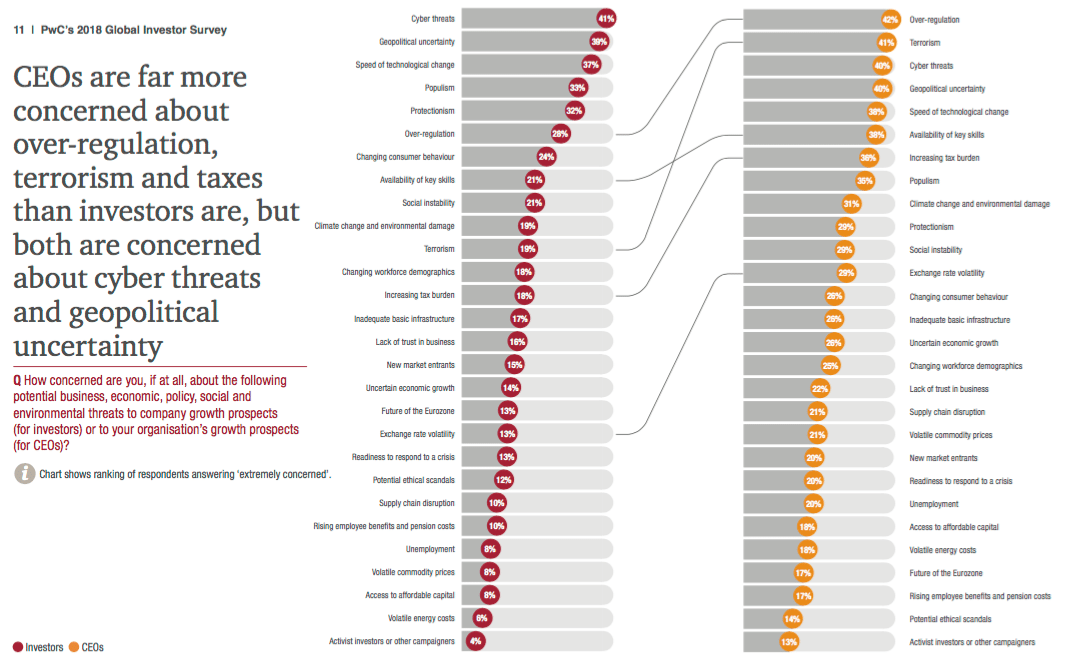
The Center for Strategic and International Studies and security company, McAfee, recently compiled a report, Economic Impact of Cybercrime–No Slowing Down, which estimated that global cyber crime has reached the 600 billion dollar threshold, officially giving this type of crime its own aaS category. In 2014, this figure was about 445 billion dollars. The threat represents a global crisis, especially given the sheer reach of cybercrime, from China’s theft of vendors’ intellectual property on F-35 fighters for its own purposes to a data breach in South Africa that resulted in the loss of private information for 31 million people (including the president and police minister).
A regional distribution of cybercrime from the report is provided below, demonstrating that major trends of state-sponsored bank robbery, ransomware, Cybercrime-as-a-Service, and an increased adherence to anonymization services are largely responsible for the ultimate worldwide cost of this category of crime.
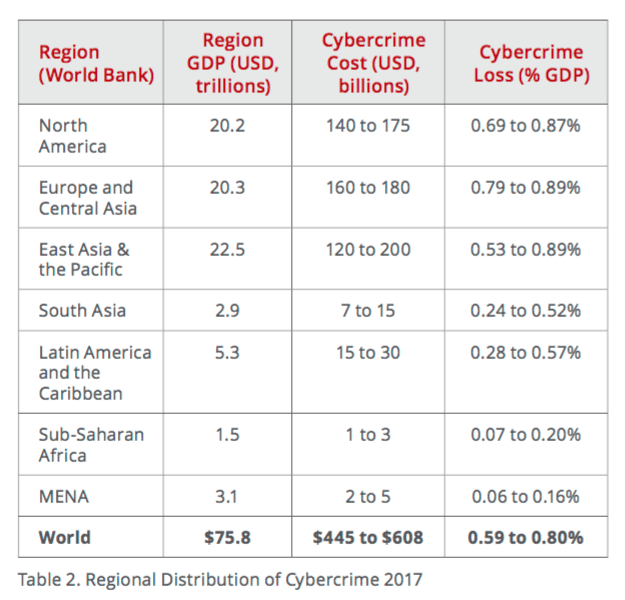
According to a 2018 report from Malwarebytes, a security firm, with the rising value of cryptocurrencies comes illicit cryptocurrency mining. With this increased activity, we have seen cryptomining surpass all other types of cyber crime to take the highest spot for top cyberthreat of 2018. Even CheckPoint, a network and data security provider, according to its latest Global Threat Index, noted that cryptomining—the act by which cybercriminals hijack a victim’s CPU or GPU power to mine cryptocurrency—has impacted 55% of organizations worldwide. Crypto-miner Coinhive replaced RoughTed as the most common threat, with a new miner, Cryptoloot, taking the third spot. One of the most shocking findings from the report was that, because ad-blocking software cuts advertisers revenues, websites are sometimes forced to turn to cryptominers as a new potential for revenue, without letting visitors to the website know. In the category of mobile malware, the top three contenders are Triada, Lokibot, and Lotoor.
As provided below by Check Point Software Technologies, the map reveals the risk index on a global scale with green comprising low risk, red at high-risk hotspots, and white with insufficient data:
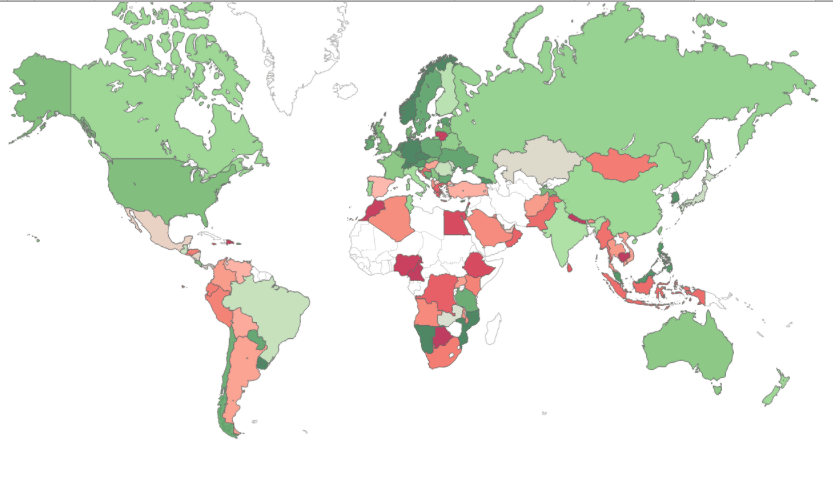
As African countries look to China for investment, in contrast to Western assistance, Chinese cyberespionage in recent months is likely to spur a reassessment. It was reported that earlier in 2018, secret data on African Union headquarters computers—an IT network which was constructed by the Chinese in Ethiopia—was being sent to Shanghai nightly between 2012 and 2017.
Geopolitically, the cyber siphoning signifies how important the continent is strategically for China, given that Beijing seeks inside information in preparation for negotiations with African leaders and given the millions of dollars in infrastructure investment the Chinese have provided Africa with.
Strategically, Africa has likely known about this activity since 2017 but has keep it quiet, demonstrating the impact the Chinese have over choices of African political players. Historically, Africa has leverage in terms of playing DC’s interests against those of Beijing, taking bids for the best aid and investment and playing one country against the other. In the past, African nations have allowed preferred military privileges to a particular side as another negotiating strategy. Nevertheless, many experts see Africa’s lack of response to Chinese actions as a signal of just how strong Beijing’s influence is on African tactical and geopolitical choices.
The Organization for Economic Cooperation and Development recently published its Digital Economy Outlook which provides strategies and emerging opportunities for countries across the globe to communicate and protect themselves in the digital economy. Singapore is one such country which, on Wednesday, announced it will be setting up its first cyber-security start-up incubation hub as the country seeks to take its place in the new digital economy. The hub will be named Innovation Cybersecurity Ecosystem @Block 71 (ICE71) and cyber-security entrepreneurs will be able to join starting in April. Singapore’s Cyber Security Agency is working closely with the founders to ensure that aspiring entrepreneurs have the capital and engine for growth.
The areas of concentration for the new hub are forensics, the Internet of Things, and managed security services. The wider cybersecurity market is a lucrative field, projected to attract spending of 105 billion dollars in the next two years.
On Friday, reports circulated that Hidden Cobra, a North Korean-linked threat group according to the US government, has changed its target to Turkey’s financial institutions. A report from McAfee and its advanced threat research team found that the group has attacked cryptocurrency, in addition to the financial sector.
The malware used to commit the attack is known as Bankshot, which lingers on a victim’s electronic system for future attacks and can also wipe previously accessed files to remove past evidence.
Researchers are finding greater evidence that smart TV’s are more susceptible to remote access than previously thought. In February, Consumer Reports released research from 5 hack tests on five brands of internet-accessible TV’s, each using a different smart TV platform. The devices were found vulnerable to even basic level hacks that would allow the hacker to change channels, the volume, access the Wi-Fi, and install new applications.
It is estimated that, by the end of the year, upwards of 700 million smart TV’s will be purchased, requiring users consent to the collection of personal detailed data about their viewing habits to come to the forefront of the digital entertainment agenda.
On Wednesday, Microsoft announced that Windows ML Artificial Intelligence Platform will make its debut with the Microsoft Windows 10 Spring Update. The novel artificial intelligence platform provides developers with the ability to use pre-trained machine learning models in-app to apply to a wide variety of Windows-based devices.
On Tuesday, SpaceX officially launched its Hispasat 30W-6 Spanish communications satellite at Cape Canaveral Air Force Station. Replay of the launch can be found here. However, in light of the recent talks of space travel, the topic of cyber security in space is becoming increasingly pertinent. Cyber security represents one of the largest unsolved challenges on Earth, but particularly in outer space, given that the more satellites that are sent, the more we depend on the data they compile and with it, location services, Earth Observation programs, and communications networks.
One company in particular is alleged to be using unencrypted satellite technology for decades now to hack into satellite networks. This company, known as Iridium, is likely stalled for the moment, given that SpaceX has encryption technology on both Starlink tester satellites, Microsat-21 and Microsat-2b. The burgeoning space travel industry leaves a wide open field for an international body to focus not just on cyber space on Earth, but on cyber security in the galaxy—on cyber and space.
US Foreign Politics
On March 8th, calls for gender parity, equal access, and fair wages rang out around the globe as the world celebrated International Women’s Day.
Today, the occasion is celebrated on March 8th and 2018 saw the movement span all corners of the world from Cambodia to Kyrgyzstan to Argentina. The day was officially designated as a UN observance in 1975, also known as International Women’s Year. The movement, however, stretches well beyond this year, tracing back to New York City in February 1908 when garment workers took to marching to protest the conditions of the workplace. With the Socialist Party of America at the helm of the charge, the day was first celebrated on February 28th, 1909. However, arguably one of the most impactful Women’s Day protests took place in Russia in 1917 on February 23rd and grew to wide worker strikes from all sectors, calling for an end to the autocracy. From that day forward, February 23rd (or March 8th in the Russian Gregorian calendar), is now recognized as the official day for the holiday.
Lima Charlie presents some interesting figures on women’s political involvement worldwide (credit: UN Women)
As of 2017, the top 7 nations with the highest percentage of women in ministerial positions were Bulgaria, France, and Nicaragua (all 52.9%), Sweden (52.2%), Canada (51.7%), Slovenia (50%), and Rwanda (47.4%).
With a 19.4% female composition in the US Congress in the 2017-2019 Term, the US ranks about 104th in a worldwide ranking of percentage of women in legislative bodies (84 serving in the 435-member House of Representatives and 22 in the 100-member Senate).
Although the majority of the globe’s countries have never had a female leader, women occupy the highest seat in Bangladesh, Switzerland, Namibia, Nepal, Norway, Poland, South Korea, Marshall Islands, Chile, Croatia, Germany, Liberia, Lithuania, Malta, and the United Kingdom. Pew Research Center provides an interactive map of women in leading political positions around the world, over the years, as illustrated below:
On Friday, March 9th, White House Press Secretary Sarah Sanders qualified some of the details of the much-anticipated meeting between President Trump and North Korean leader Kim Jong Un. Taking to the podium, Sanders said the meeting would only take place once the rogue nation takes “concrete and verifiable action” to commit itself to denuclearization. The initial announcement followed the President’s Thursday meeting with Chung Eui-Yong, a South Korean national security adviser. President Trump’s strategy has been to maximize economic pressure, send America’s resources to allies, and to isolate the dictator’s country diplomatically. The possibility of diplomacy with North Korea is unprecedented, given that no sitting American president has ever held a meeting with the nation’s leader.
Geopolitically, China entered the debate as it cautioned President Trump and Kim Jong-Un to display “political courage”, with the Beijing foreign ministry spokesman adding, “We welcome this positive signal by the US and North Korea in having direct dialogue.” Russian Foreign Minister Sergey Lavrov noted the talks were “necessary for normalizing the situation around the Korean peninsula.” Australia and France have also expressed support for the meeting, maintaining however that sanctions must remain in place on North Korea.
From a financial and economic standpoint, as Harry Kazianis—an expert on North Korea and Director of Defense Studies at the Center for the National Interest—mentioned, South Korean press has been reporting that North Korea is on the brink of financial bankruptcy, which could provide some rational as to why Kim Jong Un might be open to these talks. With their foreign exchange and dollar reserves largely drained by year-end, funding for nuclear weapons will soon dry out and the move may be an attempt to stall in the meantime. The economy of North Korea, in terms of GDP, is a fraction of that of its southern neighbor. Given 2013 numbers, North Korea’s GDP is about 33 billion dollars, while South Korea’s is 1.19 trillion dollars. CIA World Factbook estimates South Korea’s GDP at 33,200, and North Korea’s at 1,800.
US Geopolitics
The geopolitical consequences of Sunday’s Italian election are far-reaching, as approximately 50% of the country voted for EU-skeptical/populist parties which were once denoted as holding fringe ideologies. The Populist Party received about 31% of the vote and the far-right Euroskeptic League party received major gains against the center-right Forza Italia. The Populist Party became the single largest party in the country winning almost as many votes as the more traditional center-left and center-right parties. The election seemed to echo a popular cry across Europe in the recent months as disillusioned voters fight against centrist parties to elect populist leaders.
The clear leader of the country, while not cemented yet given that no single party or coalition won enough votes, will have to address the impactful results the election delivered for a fractured north-south divide. Many see this divide as a likely catalyst for a geopolitical crisis as the industrialized north and the much weaker south emerge from the election with stark financial differences. In the south, the economy has shrunk by around 7% between 2001 and 2016 and unemployment in the south is at about 18% compared to 6.6% in the north. Furthermore, the south of Italy is a key geopolitical region given its position in the middle of the Mediterranean.
With Italy as one of the biggest pro-Russian countries in Europe, the victorious party of the populists has mirrored Putin’s acrimony toward NATO, been skeptical about the bounds of the Eurozone, and has laid culpability on the EU for Russia’s incursion into Ukraine. Nevertheless, for markets, the populist election sparks a great deal of anxiety given that an inexperienced government does not instill confidence in players of the market. The possibility for a new debt crisis to arise in the continent’s third largest economy is present. With the new government, Brussels will find it difficult to reach compromise on Brexit negotiations, Eastern European spheres of influence, and the cost of sovereignty for member nations.
Geopolitically, the results of the election are difficult to predict in the long-term, but one thing is clear. Sunday’s election transformed Italy—a founding nation in the EU—into a much more detached investor in the vision of a cohesive Europe. Given influence from China and Russia to already weaken this untied whole, the election took a clear step in that exact direction.
On Monday, thousands of protestors marched in Barcelona, Spain, in support of the fictional region of Tabarnia. The protestors are opposed to attempts to split from Spain—as supporters of the Catalonia independence movement have been calling for following their independence declaration on October 27th. Tabarnia is a portmanteau for Tarragona and Barcelona, a coastal strip of land contained within Catalonia which has drawn many pro-independence members in calls to secede from Spain.
The geopolitical drift of Catalonia from Spain has been ongoing, but Tabarnia has provided a comedic refuge for anti-secession supporters to rally behind. The region went viral in December of last year, formed in order to hold up a satirical mirror to what many see as the outrageous demands of pro-Catalonia supporters to leave Spain. Pro-Tabarnia supporters, on the other hand, charge that even if Catalonia does secede from the larger country, pro-Tabarnians will geographically and politically remain a part of Spain.

The UK enters the debate as the most vociferous supporter of the pro-Catalonia secession movement. The move strikes many as a geopolitical strategy, given the clear benefit that Gibraltar would provide. Having turned the page on Brexit, the UK sees Catalonia as a wide-open opportunity to serve as an axis between London and Spain’s capital city with dominant trans-Atlantic ties.
From the Russian angle, many fear the thought of Catalonian secession, given that China or Russia would be likely to encroach upon opportunities both geographical and economic in the region.
For China, the Catalonian example provides a perfect jumping off point from which to permeate officially into ports outside of the Eurozone, a goal it has held for some time, beginning with its Belt Road Initiative. A Catalonia that stands on its own would be especially vulnerable for a Chinese sphere of influence just waiting for the opportunity to gain solid footing in European territory.
German Chancellor Angela Merkel emerged victorious on Sunday, cementing her spot as head of her country, a role she has held for 13 years. As a point of reference, during the same time span, Japan has placed 8 prime ministers in power, Italy has voted in 7, and the US and Brazil have both had three leaders. Markets immediately reacted to the result, as the euro inched slightly higher than the US dollar and pound, although the currency stayed relatively constant following the hung parliament results from Italy.
Geopolitically, Germany, China, and Central Europe have increasingly held a triad-type relationship. As EU manufacturing centers have shifted historically from Atlantic to Continental Europe, Germany has emerged as a regional production network. China’s recent focus on creating the Belt and Road Initiative has drawn Beijing into actively engaging the Central European transport network. The implications of this are that what was once a regional network is becoming a cross-continental network with Germany and China forming a triangle with Central Europe, as The Diplomat points out. China and Germany will have to compete to occupy the production space as the two major forces stand on opposite poles of the continent. With the Belt Road Initiative, Chinese influence will span cross-continent with other Asian players like Japan and Iran likely playing critical roles over the next 20 years in the process.
On Monday, New Zealand Prime Minister Jacinda Ardern commenced the country’s official tour of the Polynesian region. She visited Tonga, in particular, pledging to provide an aid package of 10 million dollars to assist in rebuilding the region following February’s Cyclone Gita.
Ardern’s visit to neighboring countries (situated in the illustration below – credit TakiMai), however, is not lost on geopolitical strategists, given that New Zealand is positioned in the Indo-Pacific and must keep a close watch on how to cope with the heightening Chinese influence while continuing relations with allies like the United States. Of note, one in five New Zealanders has heritage in Pasifika (Melanesian or Polynesian) or Maori (Polynesian).
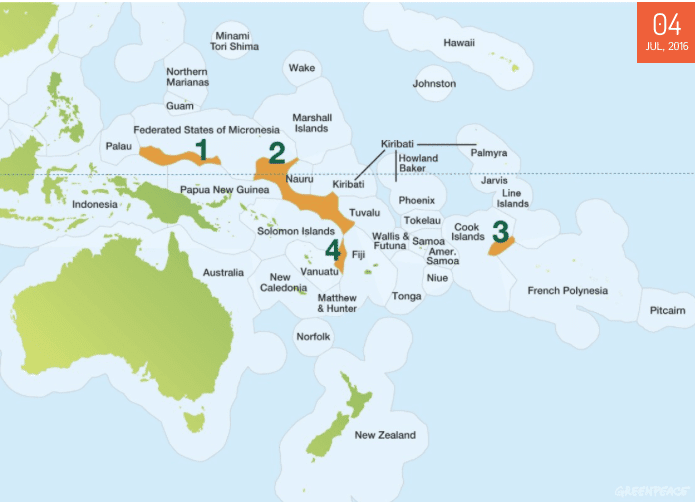
Looking to the optics of the visit, Ardern touched down in Tonga just as Tongan leaders landed in Beijing, agreeing to continue the strategic partnership between China and Tonga and marking the 20th anniversary of the establishment of these relations.
New Zealand’s attempts to reset its relations in the Pacific, as put forth in a speech by government officials, will prove a key aspect of Ardern’s term in office and, more importantly, the role of her country in the region.
For the first time in history, Australia and East Timor signed a treaty at the United Nations to delineate their maritime boundary. Of note in the historic milestone, the parties reached a compromise as to how to apportion about 65 billion dollars in projected revenue from the Timor Sea’s Great Sunrise gas fields, as illustrated below (credit AFP).
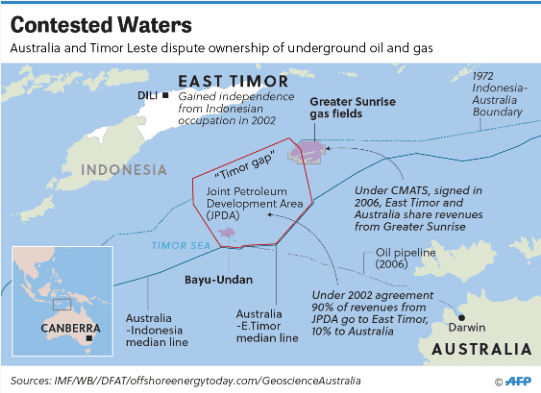
From a geopolitical point of view, immediately following the signing of the document, Indonesia announced that it would reassess its own sea border treaty with Australia, agreed to in 1971 prior to East Timor’s secession from Indonesia. Many experts believe the decision could lead to the untying of many sealed boundaries between neighboring countries in the region, especially given Indonesia’s desire to stake its own claim to gas reserves in the Timor Sea.
Since the end of the Vietnam War in 1975, no US warship has made its way to Vietnam. On Monday, the USS Carl Vinson, traveling with a Carrier Strike Group of eight aircraft squadron fighters, two destroyers, and a crew of 5,000 sailors, set sail for Da Nang.
The mission was carried out to take part in freedom of navigation operations in the South China Sea as well as for the US to assert presence in the region. Chinese tensions flared as the foreign minister suggested the move would add friction to already growing tensions in the South China Sea.
From the Russian perspective, many of Vietnam’s ships are Russian-made, such as the Tarantul V-class missile corvette, and the trip will provide the US military with a window into some of its most-current technology, an opportunity Putin is likely to be concerned about.
Global Markets and Politics
US Stocks and Oil
Friday, March 9th was the 9th anniversary of the 2009 financial crisis which left much of the market in shambles. The Dow closed at 6,547 and the S&P 500 at 677. However, the economy eventually began to pick up over the last 9 years and the S&P reached quadruple figures, as shown below by FactSet. The question remains, nevertheless, does the nine-year market have any space left to continue climbing?
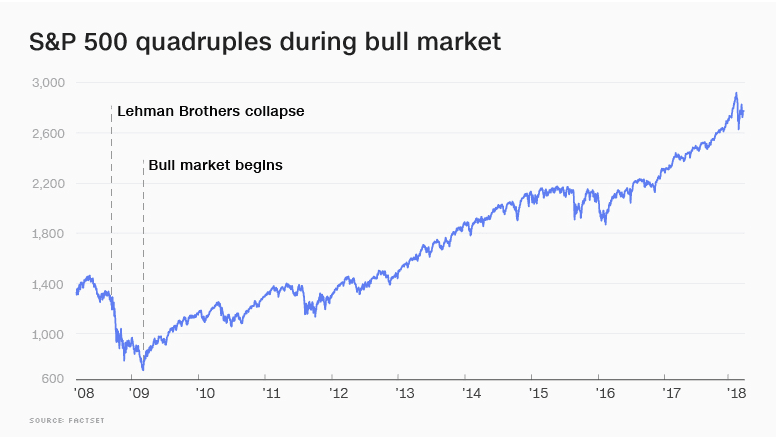
On Friday, the Nasdaq composite advanced to an all-time high by 1.8% and the Dow climbed more than 400 points, closing at 25, 335.74.
Oil prices jumped as the likelihood of a meeting between President Trump and North Korean leader Kim Jong Un spurred investors to remove an element of geopolitical risk from the equation of the crude market, from a macro perspective. Oil prices saw a rebound following two days of decline. Asian equity thresholds also saw an increase following the news as South Korea’s Kospi SEU closed 1.1% higher and Japan’s Nikkei Stock Average NIK rose upwards of 2%, finishing at a 0.5% increase.
On Friday, the Bureau of Labor Statistics released its most up-to-date February 2018 jobs report. 313,000 jobs were added last month and the unemployment rate remained unchanged at 4.1% for the fifth consecutive month. The US dollar index fell in comparison to many other currencies, despite the report, with the Euro up to 1.2313 dollars from 1.2307 in the last session and the pound up to 1.3848 from 1.3803. The Australian dollar also inched upward to 0.7847 from 0.7792. The US dollar was up 106.79 Japanese Yen, compared to last session’s 106.23 Yen.
The rate of unemployment for veterans who have served since September 2001 also dropped to 3.3%, a record low which matches the previous December figures.
LIMA CHARLIE NEWS
[Edited by Nikita Roach]
Lima Charlie provides global news, insight & analysis by military veterans and service members Worldwide.
For up-to-date news, please follow us on twitter at @LimaCharlieNews
In case you missed last week’s review:

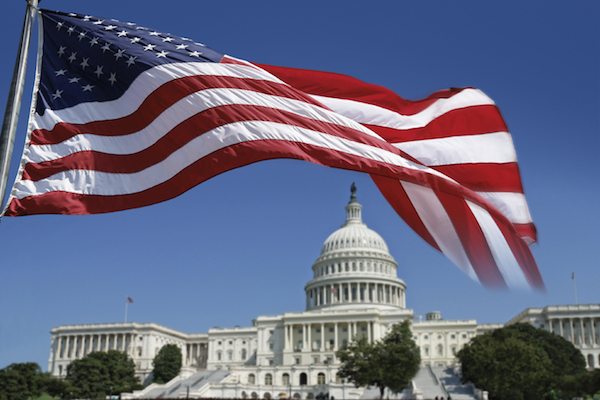
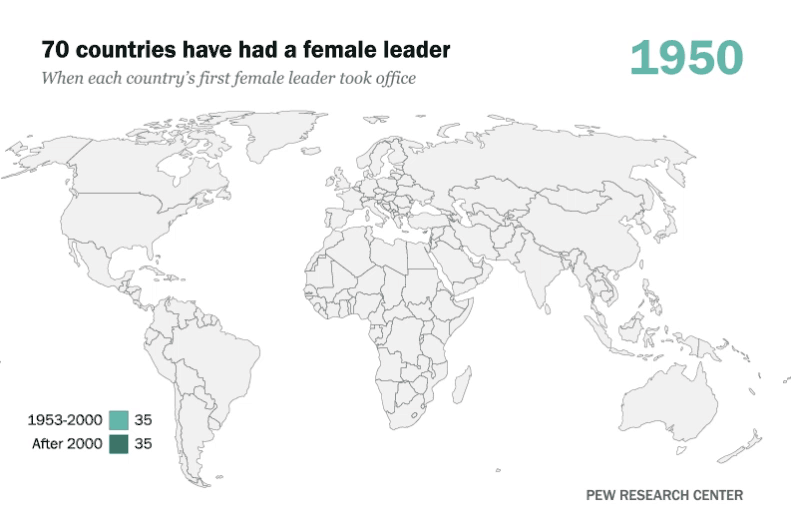

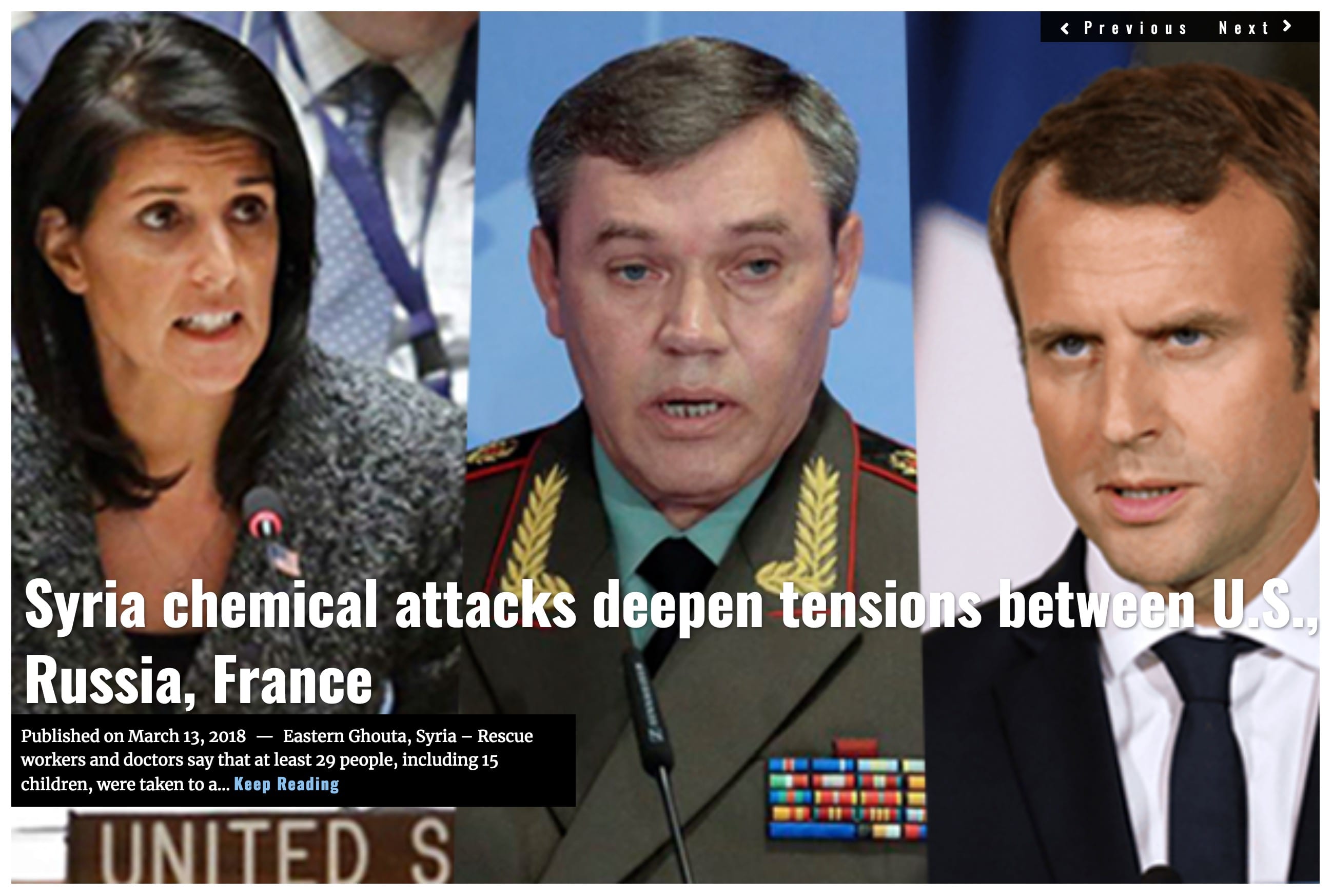
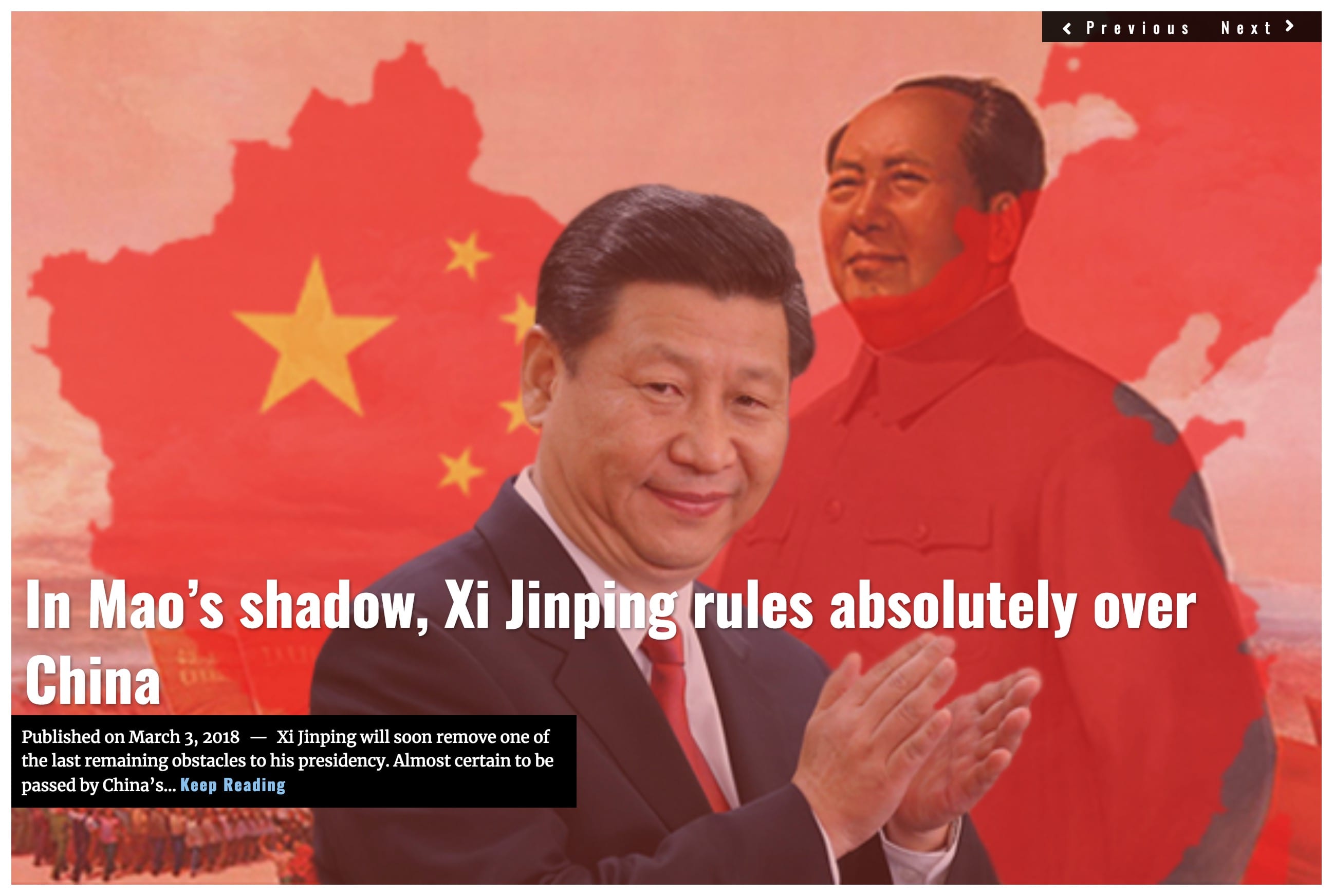


![A Trump war crime pardon dishonors us all [Lima Charlie News]](https://limacharlienews.com/wp-content/uploads/2019/05/A-Trump-war-crime-pardon-dishonors-us-all-Lima-Charlie-News-480x384.png)


![Image Memorial Day may soon be a remembrance of democracy and those who had the courage to defend it [Lima Charlie News]](https://limacharlienews.com/wp-content/uploads/2018/05/Memorial-Day-may-soon-be-a-remembrance-of-democracy-and-those-who-had-the-courage-to-defend-it-Lima-Charlie-News-480x384.png)
![The Mind of Bolton - AUMF and the New Iran War [Lima Charlie News]](https://limacharlienews.com/wp-content/uploads/2019/05/Inside-the-mind-of-Bolton-Lima-Charlie-News-main-01-480x384.png)

